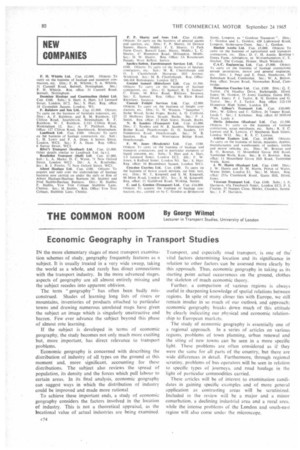THE COMMON ROOM
Page 82

If you've noticed an error in this article please click here to report it so we can fix it.
By George Wilmot
Lecturer in Transport Studies, University of London
Economic Geography in Transport Studies
IN the more elementary stages of most transport examination schemes of study, geography frequently features as a subject. It is usually treated in a very wide sweep, taking the world as a whole, and rarely has direct connections with the transport industry. In the more advanced stages, aspects of geography are all almost entirely missing and the subject recedes into apparent oblivion.
The term " geography " has often been badly misconstrued. Shades of learning long lists of rivers or mountains, inventories of products attached to particular towns and drawing numerous unrelated maps have given the subject an image which is singularly unattractive and barren. Few ever advance the subject beyond this phase of almost rote learning.
If the subject is developed in terms of economic geography, the study becomes not only much more exciting but, more important, has direct relevance to transport problems.
Economic geography is concerned with describing the distribution of industry of all types on the ground at this moment and, more significant, accounting for these distributions. The subject also reviews the spread of population, its density and the forces which pull labour to certain areas. In its final analysis, economic geography can suggest ways in which the distribution of industry could be improved and made more rational.
To achieve these important ends, a study of economic geography considers the factors involved in the location of industry. This is not a theoretical appraisal, as the locationaI value of actual industries are being examined. Transport. and especially road transport,. is one of the' vital factors determining location and its significance in relation to other factors van be assessed more clearly by this approach. Thus, economic geography in taking as its starting, point actual occurrences on the ground, clothes the skeleton of much economic theory.
Further, a comparison of various regions is always useful in sharpening knowledge of spatial relations between regions. In spite of many closer ties with Europe, we still remain insular in so much of our outlook and approach: economic geography breaks down much of this attitude by clearly indicating our physical and economic relationship to European markets.
The study of economic geography is essentially one of a regional approach. In a series of articles on various regions. problems of town planning, urban renewal and the siting of new towns can be seen in a more specific light. These problems are Often considered as if they were the same for all parts of the country, but there are wide differences in detail. Furthermore, through regional scrutiny, problems of bus operators will be seen in relation to specific types of journeys, and road haulage in the light of particular commodities carried.
These articles will be of interest to examination candidates in gaining specific examples and of more general application as contrasting areas will be 'scrutinized. Included in the review will be a major and a minor conurbation. a declining industrial area and a rural area. while the intense problems of the London and south-easi region will also come under the microscope.
























































































































